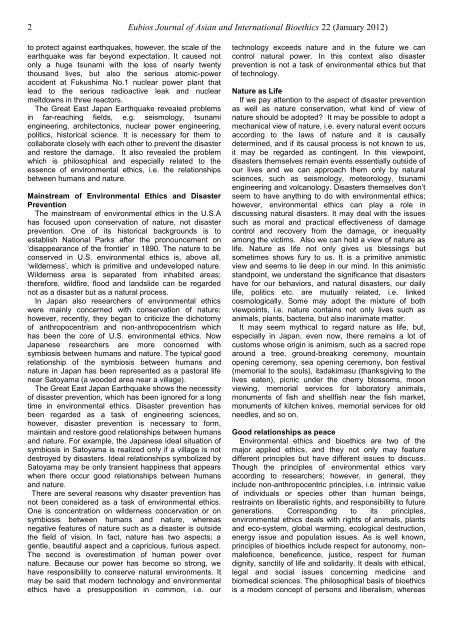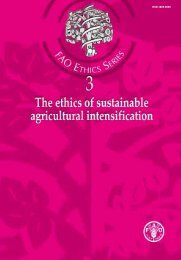Eubios Journal of Asian and International Bioethics - Eubios Ethics ...
Eubios Journal of Asian and International Bioethics - Eubios Ethics ...
Eubios Journal of Asian and International Bioethics - Eubios Ethics ...
You also want an ePaper? Increase the reach of your titles
YUMPU automatically turns print PDFs into web optimized ePapers that Google loves.
2 <strong>Eubios</strong> <strong>Journal</strong> <strong>of</strong> <strong>Asian</strong> <strong>and</strong> <strong>International</strong> <strong>Bioethics</strong> 22 (January 2012)<br />
to protect against earthquakes, however, the scale <strong>of</strong> the<br />
earthquake was far beyond expectation. It caused not<br />
only a huge tsunami with the loss <strong>of</strong> nearly twenty<br />
thous<strong>and</strong> lives, but also the serious atomic-power<br />
accident at Fukushima No.1 nuclear power plant that<br />
lead to the serious radioactive leak <strong>and</strong> nuclear<br />
meltdowns in three reactors.<br />
The Great East Japan Earthquake revealed problems<br />
in far-reaching fields, e.g. seismology, tsunami<br />
engineering, architectonics, nuclear power engineering,<br />
politics, historical science. It is necessary for them to<br />
collaborate closely with each other to prevent the disaster<br />
<strong>and</strong> restore the damage. It also revealed the problem<br />
which is philosophical <strong>and</strong> especially related to the<br />
essence <strong>of</strong> environmental ethics, i.e. the relationships<br />
between humans <strong>and</strong> nature.<br />
Mainstream <strong>of</strong> Environmental <strong>Ethics</strong> <strong>and</strong> Disaster<br />
Prevention<br />
The mainstream <strong>of</strong> environmental ethics in the U.S.A<br />
has focused upon conservation <strong>of</strong> nature, not disaster<br />
prevention. One <strong>of</strong> its historical backgrounds is to<br />
establish National Parks after the pronouncement on<br />
‘disappearance <strong>of</strong> the frontier’ in 1890. The nature to be<br />
conserved in U.S. environmental ethics is, above all,<br />
‘wilderness’, which is primitive <strong>and</strong> undeveloped nature.<br />
Wilderness area is separated from inhabited areas;<br />
therefore, wildfire, flood <strong>and</strong> l<strong>and</strong>slide can be regarded<br />
not as a disaster but as a natural process.<br />
In Japan also researchers <strong>of</strong> environmental ethics<br />
were mainly concerned with conservation <strong>of</strong> nature;<br />
however, recently, they began to criticize the dichotomy<br />
<strong>of</strong> anthropocentrism <strong>and</strong> non-anthropocentrism which<br />
has been the core <strong>of</strong> U.S. environmental ethics. Now<br />
Japanese researchers are more concerned with<br />
symbiosis between humans <strong>and</strong> nature. The typical good<br />
relationship <strong>of</strong> the symbiosis between humans <strong>and</strong><br />
nature in Japan has been represented as a pastoral life<br />
near Satoyama (a wooded area near a village).<br />
The Great East Japan Earthquake shows the necessity<br />
<strong>of</strong> disaster prevention, which has been ignored for a long<br />
time in environmental ethics. Disaster prevention has<br />
been regarded as a task <strong>of</strong> engineering sciences,<br />
however, disaster prevention is necessary to form,<br />
maintain <strong>and</strong> restore good relationships between humans<br />
<strong>and</strong> nature. For example, the Japanese ideal situation <strong>of</strong><br />
symbiosis in Satoyama is realized only if a village is not<br />
destroyed by disasters. Ideal relationships symbolized by<br />
Satoyama may be only transient happiness that appears<br />
when there occur good relationships between humans<br />
<strong>and</strong> nature.<br />
There are several reasons why disaster prevention has<br />
not been considered as a task <strong>of</strong> environmental ethics.<br />
One is concentration on wilderness concervation or on<br />
symbiosis between humans <strong>and</strong> nature, whereas<br />
negative features <strong>of</strong> nature such as a disaster is outside<br />
the field <strong>of</strong> vision. In fact, nature has two aspects; a<br />
gentle, beautiful aspect <strong>and</strong> a capricious, furious aspect.<br />
The second is overestimation <strong>of</strong> human power over<br />
nature. Because our power has become so strong, we<br />
have responsibility to conserve natural environments. It<br />
may be said that modern technology <strong>and</strong> environmental<br />
ethics have a presupposition in common, i.e. our<br />
technology exceeds nature <strong>and</strong> in the future we can<br />
control natural power. In this context also disaster<br />
prevention is not a task <strong>of</strong> environmental ethics but that<br />
<strong>of</strong> technology.<br />
Nature as Life<br />
If we pay attention to the aspect <strong>of</strong> disaster prevention<br />
as well as nature conservation, what kind <strong>of</strong> view <strong>of</strong><br />
nature should be adopted? It may be possible to adopt a<br />
mechanical view <strong>of</strong> nature, i.e. every natural event occurs<br />
according to the laws <strong>of</strong> nature <strong>and</strong> it is causally<br />
determined, <strong>and</strong> if its causal process is not known to us,<br />
it may be regarded as contingent. In this viewpoint,<br />
disasters themselves remain events essentially outside <strong>of</strong><br />
our lives <strong>and</strong> we can approach them only by natural<br />
sciences, such as seismology, meteorology, tsunami<br />
engineering <strong>and</strong> volcanology. Disasters themselves don’t<br />
seem to have anything to do with environmental ethics;<br />
however, environmental ethics can play a role in<br />
discussing natural disasters. It may deal with the issues<br />
such as moral <strong>and</strong> practical effectiveness <strong>of</strong> damage<br />
control <strong>and</strong> recovery from the damage, or inequality<br />
among the victims. Also we can hold a view <strong>of</strong> nature as<br />
life. Nature as life not only gives us blessings but<br />
sometimes shows fury to us. It is a primitive animistic<br />
view <strong>and</strong> seems to lie deep in our mind. In this animistic<br />
st<strong>and</strong>point, we underst<strong>and</strong> the significance that disasters<br />
have for our behaviors, <strong>and</strong> natural disasters, our daily<br />
life, politics etc. are mutually related, i.e. linked<br />
cosmologically. Some may adopt the mixture <strong>of</strong> both<br />
viewpoints, i.e. nature contains not only lives such as<br />
animals, plants, bacteria, but also inanimate matter.<br />
It may seem mythical to regard nature as life, but,<br />
especially in Japan, even now, there remains a lot <strong>of</strong><br />
customs whose origin is animism, such as a sacred rope<br />
around a tree, ground-breaking ceremony, mountain<br />
opening ceremony, sea opening ceremony, bon festival<br />
(memorial to the souls), itadakimasu (thanksgiving to the<br />
lives eaten), picnic under the cherry blossoms, moon<br />
viewing, memorial services for laboratory animals,<br />
monuments <strong>of</strong> fish <strong>and</strong> shellfish near the fish market,<br />
monuments <strong>of</strong> kitchen knives, memorial services for old<br />
needles, <strong>and</strong> so on.<br />
Good relationships as peace<br />
Environmental ethics <strong>and</strong> bioethics are two <strong>of</strong> the<br />
major applied ethics, <strong>and</strong> they not only may feature<br />
different principles but have different issues to discuss.<br />
Though the principles <strong>of</strong> environmental ethics vary<br />
according to researchers; however, in general, they<br />
include non-anthropocentric principles, i.e. intrinsic value<br />
<strong>of</strong> individuals or species other than human beings,<br />
restraints on liberalistic rights, <strong>and</strong> responsibility to future<br />
generations. Corresponding to its principles,<br />
environmental ethics deals with rights <strong>of</strong> animals, plants<br />
<strong>and</strong> eco-system, global warming, ecological destruction,<br />
energy issue <strong>and</strong> population issues. As is well known,<br />
principles <strong>of</strong> bioethics include respect for autonomy, nonmaleficence,<br />
beneficence, justice, respect for human<br />
dignity, sanctity <strong>of</strong> life <strong>and</strong> solidarity. It deals with ethical,<br />
legal <strong>and</strong> social issues concerning medicine <strong>and</strong><br />
biomedical sciences. The philosophical basis <strong>of</strong> bioethics<br />
is a modern concept <strong>of</strong> persons <strong>and</strong> liberalism, whereas

















